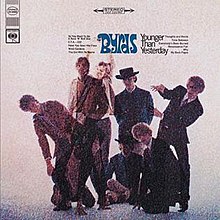Released in 1967, the Byrds' fourth album YOUNGER THAN YESTERDAY saw the band saw the band having to commit itself to release a record after the recent loss of their principle and prolific songwriter and lead singer Gene Clark. To be sure , Clark's departure is said to have been caused by a money dispute ; he received more royalties than other band members because of his songwriting contributions. Admirably, Roger (nee Jim) McGuinn. Chris Hillman and David Crosby took up the loss and contributed high caliber material to fill in the void left by Clark, the result being YOUNGER THAN YESTERDAY, which I would argue is their best and most important record and certainly one of the best and most important studio albums by an American rock band in the Sixties. Clark's absence force the other members to draw on their own musical passions and, taking their cue boldly from what the Beatles were doing with their experiments, handily expanded their sound far beyond the jangling-folk rock that initially launched them . The harmonies remain without peer, and we saw the very early integration of jazz, Indian raga, country and western , psychedelia and electronics into their musical weave. Smart, disciplined production by Gary Usher keeps this record form becoming a swamp of overcooked pretensions--he was the man who had the job to say "that's enough". SO YOU WANNA BE A ROCK AND ROLL STAR, EVERYBODY'S BEEN BURNED, WHY, RENAISSANCE FAIR, TIME BETWEEN-- the songs are first rate and the confidence these fellows confront all the alien influence and make part of their sound and legacy is amazing. It sounds fresh, alive, 53 years after its release. The only down side on this disc is the last track on the last side (from the original release) , Mind Garden", an un-navigable mind-blown miasma from David Crosby . It was the day, I suppose, when drugs were exciting, most of us working day jobs after school to have cash to buy records from major corporations believed a Revolution was pending, waiting in the winds , and that many musicians and producers, always marketers, thought they needed a song about altered consciousness to appeal to the gullible teen and the witless rock critic. I assume Crosby was sincere in his attempt to get the experience of having a blown mind in song form, but its a mess. I even thought that in 1967, when I was still in junior high.


No comments:
Post a Comment